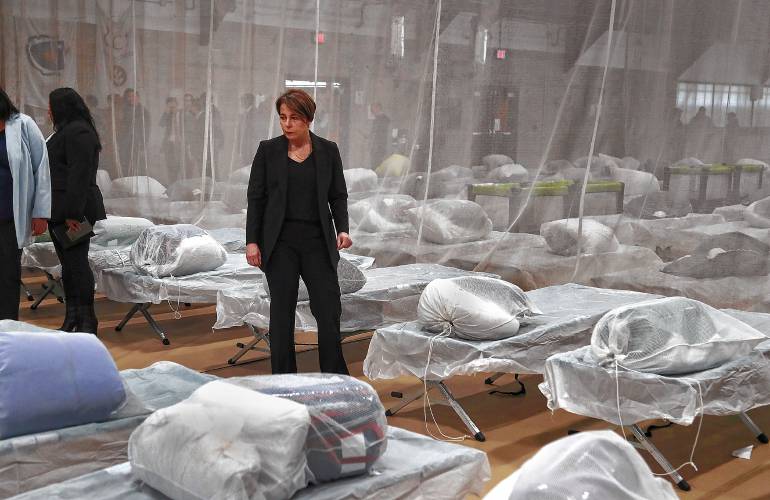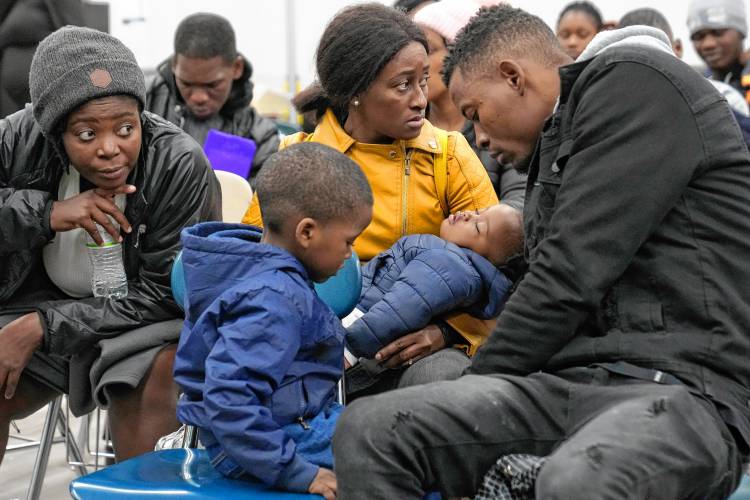Polls find Massachusetts voters locked in on immigration issue
| Published: 02-09-2024 4:06 PM |
Two polls released this week gave mixed signals regarding voters’ feelings about the job Gov. Maura Healey is doing and the level of support for Nikki Haley here ahead of next month’s presidential primary, but what was clear from both surveys was that Massachusetts voters have immigration and border control at the front of their minds.
Immigration has grown into a major issue on Beacon Hill over the last year or so as a surge of migrants seeking asylum or other federal protection in Massachusetts has stressed the state’s emergency shelter system and budget. It is also shaping up as a central issue in the expected presidential election rematch between President Joe Biden and Donald Trump this fall.
A Suffolk University poll of 1,000 Massachusetts voters who said they were at least somewhat likely to vote this November found that “immigration and border security” was the second most important issue on voters’ minds (25.2% said it was the top issue), slightly trailing “the future of American democracy” (27.1%). Similarly, “illegal immigration” ranked by respondents as the second-biggest threat to U.S. interests (27.7%), behind only “China’s expanding power across the globe” (28.2%).
And 46.8% of people polled by Suffolk said that the U.S. border and the number of immigrants entering the country (legally or illegally is not specified) is “an emergency situation, and among the most serious issues facing the U.S.” Another 31.5% of respondents said it is “a major problem, but not an emergency.”
A separate poll of 788 likely Massachusetts primary voters released Thursday by the Fiscal Alliance Foundation revealed strong feelings around the migrant situation, with a majority of respondents saying they do not think Massachusetts can accommodate additional migrants (65.2%) and that tax dollars should not be used to provide shelter to migrants (53.3%).
“Massachusetts voters told us they see immigration as a major issue in the 2024 election, and it is certainly an issue to watch between now and November,” David Paleologos, director of the Suffolk University Political Research Center, said when his poll was released Wednesday. “The majority of voters support a temporary work visa as a way for migrants to start a new life while they are here, work to support their family, pay taxes and be accounted for within the communities they are living in.”
The Suffolk poll asked the more specific questions about the migrant crisis. For example, it asked about the Healey administration’s decision to use the Melnea Cass Recreation Center in Roxbury as a temporary overflow shelter. Just less than half of respondents, 48.9%, said they support moving migrants from Logan Airport to the Roxbury rec center while 40.3% said they opposed the move and 10% said they were undecided.
By a margin of almost 2 to 1 (61.7% to 32.3%), voters polled by Suffolk supported granting temporary work visas to migrants being housed at the Roxbury site. The Healey administration has maintained that getting migrants authorized to work is critical to moving families out of state shelters and taking some of the pressure off the system.
Article continues after...
Yesterday's Most Read Articles
Massachusetts Fiscal Alliance spokesperson Paul Craney said the handful of migrant crisis-related questions in his group’s latest poll tapped into the strongest policy issue opinions he can remember seeing from any of his group’s previous polls.
“It really stood out. It was to the point where we were double-checking to see if it was an error,” Craney said. “But we’ve never seen such strong feelings toward questions before.”
The Fiscal Alliance poll asked voters, “With no source of sustainable funding going forward, do you think Massachusetts taxpayers can continue to sustain this current level of migration into the state?” About 72.5% of respondents said no, while just under 14% said it is sustainable.
Since declaring a state of emergency around the shelter crisis last summer, Healey has repeatedly called on the federal government to provide funding for states like Massachusetts that have been overwhelmed by the surge of migrants. She and other officials have repeatedly declared that the problem is not one that Massachusetts created.
Voters seem to agree with Healey. The Fiscal Alliance poll found that about two-thirds of voters hold the federal government most responsible for the flow of migrants (38.58% blame Biden and 26.52% blame Congress), while about 11.4% blame state government (6.98% blame Healey and 4.44% blame the state Legislature).
Whether voters here carry their blame of Biden into the voting booth remains to be seen. Both polls found Biden has the support of more than 70% of likely Democratic primary voters — Suffolk’s poll put him at 70.26% and the Fiscal Alliance poll pegged the president’s support at 73.5%. The Massachusetts presidential primary is March 5.
The two polls painted slightly different pictures of the Republican primary, a contest that is essentially down to Trump or Haley. The Fiscal Alliance polls showed Trump besting Haley with 65% support to her 21% support. But the Suffolk poll shows a tighter race, with Trump leading Haley 55% to 38%.
Jim Eltringham, whose D.C. polling company Advantage Inc. conducted the poll for the Fiscal Alliance, said the unenrolled voters he surveyed were twice as likely to pull a Republican primary ballot than a Democratic primary ballot next month, in part because that contest is viewed as the more competitive race. But it also could indicate something about support for Haley here, he said.
“If you dig in and you look at Nikki Haley’s support, a lot of it is similar to New Hampshire, where a lot of her support is coming from those Independents who are pulling [Republican] ballots,” Eltringham said. “The Independents who were pulling [Republican] ballots are still breaking for Trump, but at a lesser rate.”
The two polls also differed on how voters feel about the job Healey is doing as governor.
The Fiscal Alliance poll found that 46.32% of voters have either a strongly favorable view of Healey (26.52%) or a somewhat favorable view of her (19.8%). And 37.31% view the governor either strongly (26.14%) or somewhat (11.17%) unfavorably.
Suffolk’s poll showed that 54% of voters either approve (35%) or strongly approve (15%) of the job that Healey is doing as governor, while 31% said they either disapprove (15.1%) or strongly disapprove (15.9%) of the job the first-term governor is doing.








 South County Notebook: Aug 17, 2025
South County Notebook: Aug 17, 2025 Mohawk Trail students to see new staff, new codes of conduct upon Aug. 27 return to school
Mohawk Trail students to see new staff, new codes of conduct upon Aug. 27 return to school Grand opening of Buckland-Shelburne Elementary School playground set for Aug. 26
Grand opening of Buckland-Shelburne Elementary School playground set for Aug. 26 Bear-y unwelcome: Why MassWildlife says it’s time to ‘break up’ with bird feeders
Bear-y unwelcome: Why MassWildlife says it’s time to ‘break up’ with bird feeders
